It's been a few months since Larry Kudlow, the director of the Trump White House's National Economic Council, boasted that the U.S. budget deficit "is coming down, and it's coming down rapidly." This was, as regular readers know, spectacularly wrong. Though the deficit shrank during Barack Obama's presidency, it's grown considerably larger since Donald Trump took office.
How much larger? Thanks in large part to Republican tax breaks for the wealthy and big corporations, the latest tallies are jaw-dropping.
The U.S. budget deficit is reaching levels that are abnormally high for a robust economy, and lawmakers from both parties are proposing ideas that would make the deficit swell even further.The government spent $895 billion more than it brought in from taxes and other revenue sources during the past 11 months, the Congressional Budget Office said this week, a 33 percent increase from one year before.
As the Washington Post's report on this makes clear, the last time the unemployment rate was as low as it is now, the deficit literally did not exist -- it was 2000, the end of the Clinton presidency, and the federal government ran a surplus -- which stands in stark contrast to the fiscal landscape Americans currently see.
Circling back to our previous coverage, there are a few key angles to this to keep in mind. The first is that Donald Trump's campaign assurances about balancing the budget and eliminating the national debt should be near the top of the list of his broken promises.
Second, it's now painfully obvious that the Republican Party, which spent the Obama era pretending to care deeply about fiscal responsibility and the terrible burdens deficits place on future generations, operated in bad faith.
And third, every Republican who said the GOP tax breaks for the wealthy would pay for themselves ought to face some renewed questioning about how very wrong they were.
As we discussed a few months ago, it's worth emphasizing that I'm not a deficit hawk, and I firmly believe that larger deficits, under some circumstances, are absolutely worthwhile and necessary.
These are not, however, those circumstances. When the economy is in trouble, it makes sense for the United States to borrow more, invest more, cushion the blow, and help strengthen the economy.
The Trump White House and the Republican-led Congress, however, decided to approve massive tax breaks for the wealthy and big corporations when the economy was already healthy -- not because they were addressing a policy need, but because they were fulfilling an ideological goal.
And now that the deficit is spiraling, those same Republicans have decided that what the nation really needs is more tax breaks -- none of which will be paid for -- and cuts to Medicare and Social Security.
If there's a compelling defense for such an approach, it's hiding well.
